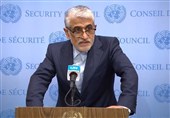US to Pay Price for Leaving JCPOA, Pressing EU: SIPRI Chief
TEHRAN (Tasnim) – The director of the Stockholm International Peace Research Institute (SIPRI) said the US would pay a price in the long run for unilaterally withdrawing from the 2015 nuclear deal between Tehran and world powers despite the EU’s opposition.
“In the longer term, the US will pay a price for unilaterally breaking out of the JCPOA and attempting to press the EU into implementing a policy it opposes. However, that is the longer term and this US administration does not seem much focused on longer term considerations,” Dan Smith told Tasnim.
Dan Smith has a long record of research and publication on a wide range of conflict and peace issues such as nationalism, identity politics, armed conflicts, ethics of intervention, gender aspects of conflict and peace building. In recent years, his work has broadened to encompass other contemporary issues such as the relationship between climate change and insecurity, peace and security issues in the Middle East and global conflict trends. Smith has served four years in the UN Peacebuilding Fund Advisory group, two of which (2010–2011) were as Chair. He has lived most of his adult life in the UK with a 10-year spell in Norway. He has traveled professionally to more than 60 countries.
The following is the full text of the interview.
Tasnim: On August 23, the European Commission adopted a first package of €18 million for projects in support of sustainable economic and social development in the Islamic Republic of Iran, including €8 million assistance to the private sector. High Representative/Vice-President Federica Mogherini said, “Since the renewal of the EU-Iran relations as a result of the Iran nuclear deal, cooperation has developed in many sectors. We are committed to sustain it and this new package will widen economic and sectoral relations in areas that are of direct benefit to our citizens”. What do you think about the package? How much could this help Iran?
Smith: It is important that the EU is seeking ways to support the continuation of the JCPOA. I am encouraged that they are trying to follow fine words with the right deeds. This is an encouraging first step. I hope it is not the only action the EU takes because by itself it is not nearly enough to make a real difference for Iran.
Tasnim: US Secretary of State Mike Pompeo recently named senior policy adviser Brian Hook as special representative for Iran in charge of “Iran Action Group” to coordinate Trump’s pressure campaign on the Islamic Republic following Washington’s withdrawal from an international nuclear deal with Tehran. What’s your take on the action group?
Smith: It is not at all clear what the effect of the Action Group will be.The US administration’s policy has been set and the Group’s main mandate will be to ensure it is carried out. However, pressure can be put on US allies in different ways with different degrees of regard for their sensitivities. Whether the Action Group will make things easier or harder for the EU over the US-Iran relationship is hard to tell.
Tasnim: President Trump’s national security adviser John Bolton said on August 22 that the Europeans have to make a choice between the US and Iran in observing American sanctions. How much do you think Europe could resist?
Smith: EU trade with the US is far, far greater than EU trade with Iran. Therefore, if pushed to a choice, relations with the US will take priority. This is especially true for businesses and the EU can only do a limited amount to press European companies to continue trading with and investing in Iran. Things are complicated, however, by the current round of so-called “trade wars”; if EU relationships with the US deteriorate significantly, there might be more room for maneuver for the EU in relation to Iran.
In the longer term, the US will pay a price for unilaterally breaking out of the JCPOA and attempting to press the EU into implementing a policy it opposes. However, that is the longer term and this US administration does not seem very focused on longer term considerations.
Tasnim: Do you believe that new round of talks between Tehran and Washington could change anything given to the fact that other parties of the JCPOA have remained committed to the deal?
Smith: President Trump’s diplomatic maneuvers can always surprise observers but at present, it seems unlikely that new talks would quickly produce a viable compromise. Several rounds of talks might be required before a workable agreement could reproduce. It would be worth making that effort if at all possible.






